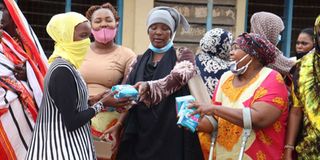Make sanitary towels widely affordable

Gender activists issue sanitary towels to girls in Kalkacha village,Tana River County.
What you need to know:
- The sexual and reproductive health needs of girls should not be overlooked.
- Studies show up to 95 per cent of girls in low-income settings miss or struggle at school during menstruation if they cannot effectively manage it.
- Greater understanding decreases the stigma attached to buying menstrual hygiene products from a shop.
It has become difficult for girls and women to manage their periods safely and with dignity during the Covid-19 pandemic.
A recent study in Nairobi’s low-income areas shows girls and women continue to face practical and psychological challenges during menstruation.
Access to menstrual hygiene products is a major challenge for women and girls in developing countries and is an aspect of water, sanitation and hygiene that is often overlooked. They have considerable difficulty in going about their lives during periods and can be almost entirely restricted to the home due to lack of the items and stigma.
Studies show up to 95 per cent of girls in low-income settings miss or struggle at school during menstruation if they cannot effectively manage it. Safe, accessible menstrual hygiene products have a considerable positive impact on women and girls’ occupational, social and educational capacity.
The sexual and reproductive health needs of girls should not be overlooked. Sanitary pads give girls and women dignity and freedom.
The Basic Education (Amendment) Act requires the government to provide free, sufficient and quality sanitary towels to every public school girl. A project funded by the government and the UN Population Fund (UNFPA) to provide girls with sanitary towels. But schools were closed in March due to the pandemic.
Cannot afford pads
Research by Menstrual Hygiene Day, a global advocacy platform for NGOs and government agencies to promote menstrual health, shows that 65 per cent of women and girls in Kenya cannot afford sanitary pads.
UNFPA has called for special attention to menstrual health items since supply chains have been disrupted by the pandemic.
lt is imperative for the government to reduce the price of the sanitary pads to the level of the face masks being worn for prevention of Covid-19. The prices of the masks were as high as Sh100 but went down to Sh50 and now, in Mombasa, they cost Sh10.
Access to menstrual hygiene products can be increased through improving their availability and affordability and enhancing understanding of this topic in the community. Let the national government contract the counties that are making personal protection equipment (PPE) to also make affordable sanitary pads that are widely available.
It is far more sustainable to ensure that an affordable and consistent supply of the reusable menstrual hygiene product of choice is available, which can be done through private sector development by working with local suppliers and supporting the supply chain with investment to overcome key bottlenecks and technical assistance to produce an effective yet low-cost product where required.
Greater understanding decreases the stigma attached to buying menstrual hygiene products from a shop, and increases the likelihood that men in charge of a family’s finances will provide menstrual hygiene products to the female family members.
Ms Onjoro is a PhD student at Mount Kenya University, Mombasa. [email protected].





